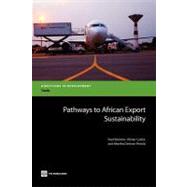Pathways to African Export Sustainability
, by Brenton, Paul; Cadot, Olivier; Pierola, Martha Denisse- ISBN: 9780821395592 | 0821395599
- Cover: Paperback
- Copyright: 7/17/2012
African exporters suffer from low survival rates on international markets. They fail more often than others, incurring time and again the setup costs involved in starting new relationships. This high churning is a source of waste, uncertainty, and discouragement. However, this volume shows that this is not inevitable. The high infant mortality of African exports is largely explained by the difficulty of Africa's low-income business environment-once properly benchmarked, Africa's performance in terms of exporter failure is no outlier. Moreover, as in other low-income countries, African exporters show vigorous entrepreneurship, with high entry rates into new products and markets in spite of the formidable hurdles created by poor infrastructure, landlockedness for some, and limited access to major sea routes for others. African exporters experiment a lot, and frequent failure is a price to pay for experimentation. What matters for policy is to ensure that viable ventures survive.Research carried out for this volume demonstrates that governments can and should help to reduce the "high infant mortality" of African export ventures through a mixture of improvements in the business environment and well-targeted proactive interventions. The business environment can be made more conducive to sustainable export entrepreneurship through traditional policy prescriptions such as reducing transportation costs, facilitating trade through better technology and workflow in border management, improving the effectiveness of banking regulations to ensure the availability of trade finance, and striving for regulatory simplicity and coherence. In addition, governments can help exporters leverage synergies between exporters. Original research carried out for this volume shows that African exporters improve each other's chances of survival when a critical mass of them penetrate a given market together. They also benefit from the presence of national diasporas in the destination markets. With adequate donor support and private-sector engagement, export-promotion agencies and technical-assistance programs can help leverage those synergies.






